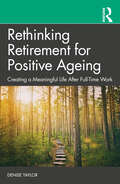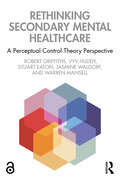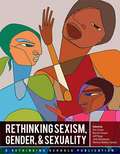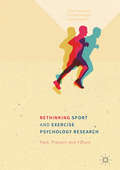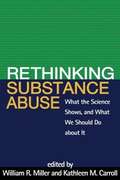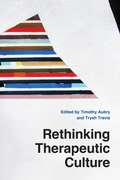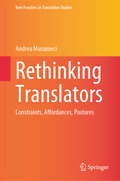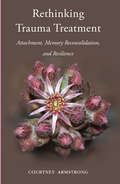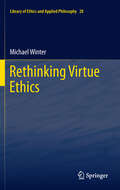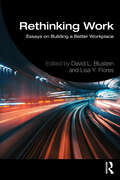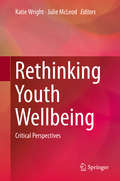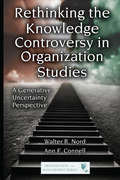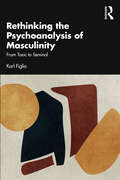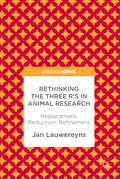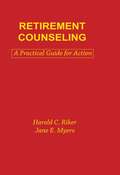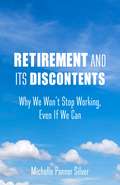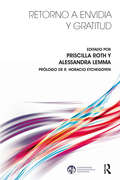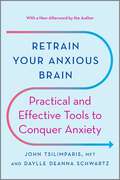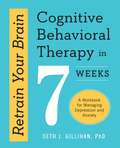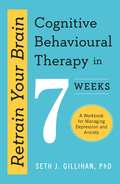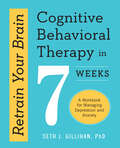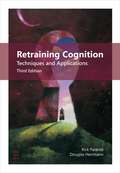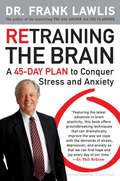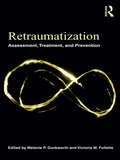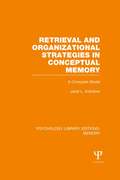- Table View
- List View
Rethinking Retirement for Positive Ageing: Creating a Meaningful Life After Full-Time Work
by Denise TaylorRethinking Retirement for Positive Ageing is a practical guide that shows you how to make retirement successful, based on the most up-to-date research available. It encourages a deeper and wider view of retirement and reveals how retirement can be a time of transition, renewal, and re-imagination. Written by career coach Dr Denise Taylor, it considers the psychological factors that impact a successful adjustment to retirement and offers a deeper analysis of how people can find meaning and purpose after full-time work. It examines retirement as an event that often brings about great changes in a person’s personal and social life, and how to move forward with meaning in life. Illustrated with interviews, activities, and case studies, and with exercises and questions for reflection, it covers key topics including identity, health, well-being, finances, and relationships. This insightful guidebook is for all prospective and current retirees as well as employers, careers professionals, and counsellors who want to help people reflect on their approaches to retirement. You can visit the website at https://denisetaylor.co.uk/rethinking-retirement/
Rethinking Secondary Mental Healthcare: A Perceptual Control Theory Perspective
by Warren Mansell Robert Griffiths Vyv Huddy Stuart Eaton Jasmine WaldorfThis book considers how principles derived from a theory of human behaviour - Perceptual Control Theory - can be applied to create mental health services that are more effective, efficient, and humane. Authored by clinicians, academics, and experts-by-experience, the text explores the way Perceptual Control Theory (PCT) principles can be applied within the secondary mental healthcare system – from the overall commissioning and design of services to the practice of individual clinicians. A range of topics relevant to the delivery of secondary mental healthcare are covered, including community and inpatient working, the delivery of individual psychological therapy, the use of restrictive practices, and working with relatives and carers. The book concludes by describing PCT’s unique contribution to the field of mental healthcare. The book, one of the first of its kind, will be of interest to students and practitioners from a range of health and social care backgrounds, as well as service managers, commissioners, academics, and policy makers. The Open Access version of this book, available at http://www.taylorfrancis.com, has been made available under a Creative Commons [Attribution-Non Commercial-No Derivatives (CC-BY-NC-ND)] 4.0 license.
Rethinking Sexism, Gender, And Sexuality
by Jody Sokolower Rachel Harper Jeff Sapp Kim Cosier Melissa Bollow TempelHow do you respond when a child asks, "Can a girl turn into a boy?" What if your daughter brings home school books with sexist, racist stories? What does "queering the curriculum" look like? What's wrong with "anti-bullying" policies? What are alternatives? <P><P> Rethinking Sexism, Gender, and Sexuality is a collection of inspiring stories about how to integrate feminist and LGBTQ content into curriculum, make it part of a vision for social justice, and create classrooms and schools that nurture all children and their families.
Rethinking Sport and Exercise Psychology Research
by Peter Hassmén Richard Keegan David PiggottThis book provides a comprehensive historical account of the evolution of Sport and Exercise Psychology research, charting the progression of the field from the early days when well-controlled experimental research was the standard, to the subsequent paradigm war between positivism, post-positivism and constructivism. The book challenges current thinking and makes a plea for a move towards a future in which the accumulation of knowledge is at the core of Sport and Exercise research, rather than simply methods and measurements. The result is a critique not only of exercise and sport psychology, but of psychological research methods more broadly. It will be of great interest to researchers and students working in Sport Science, Research Methods, and Psychology.
Rethinking Substance Abuse
by William MillerWhile knowledge on substance abuse and addictions is expanding rapidly, clinical practice still lags behind. This state-of-the-art book brings together leading experts to describe what treatment and prevention would look like if it were based on the best science available. The volume incorporates developmental, neurobiological, genetic, behavioral, and social-environmental perspectives. Tightly edited chapters summarize current thinking on the nature and causes of alcohol and other drug problems; discuss what works at the individual, family, and societal levels; and offer robust principles for developing more effective treatments and services.
Rethinking Therapeutic Culture
by Trysh Travis Timothy AubrySocial critics have long lamented America’s descent into a “culture of narcissism,” as Christopher Lasch so lastingly put it fifty years ago. From “first world problems” to political correctness, from the Oprahfication of emotional discourse to the development of Big Pharma products for every real and imagined pathology, therapeutic culture gets the blame. Ask not where the stereotype of feckless, overmedicated, half-paralyzed millennials comes from, for it comes from their parents’ therapist’s couches. Rethinking Therapeutic Culture makes a powerful case that we’ve got it all wrong. Editors Timothy Aubry and Trysh Travis bring us a dazzling array of contributors and perspectives to challenge the prevailing view of therapeutic culture as a destructive force that encourages narcissism, insecurity, and social isolation. The collection encourages us to examine what legitimate needs therapeutic practices have served and what unexpected political and social functions they may have performed. Offering both an extended history and a series of critical interventions organized around keywords like pain, privacy, and narcissism, this volume offers a more nuanced, empirically grounded picture of therapeutic culture than the one popularized by critics. Rethinking Therapeutic Culture is a timely book that will change the way we’ve been taught to see the landscape of therapy and self-help.
Rethinking Translators: Constraints, Affordances, Postures (New Frontiers in Translation Studies)
by Andrea MusumeciThis book introduces a new area of research known as "translator's posture". With technical, pedagogical, and sociological dimension, posture is valuable to learners, researchers, educators, and practitioners alike. The technical dimension aims to invite practitioners and more advanced learners to reflect on their position within translation environments and establish their posture as translators with more ecological awareness. The pedagogical framework is grounded in an original conceptual exploration of translation constraints, leading to an ecologically inspired perspective on translation affordances. The sociological aspect draws on the notion of authorial posture in sociology of literature. The book also presents the action research data collection from a translation theory module in a Hong Kong University, supporting the integration of postural learning into curricula. This book aims to benefit global academic and professional communities in translation studies.
Rethinking Trauma Treatment: Attachment, Memory Reconsolidation, And Resilience
by Courtney ArmstrongCreating safety, hope, and secure attachment to transform traumatic memories. What makes trauma therapy effective? The answers might surprise you. While therapists have been bombarded with brain science, hundreds of new models, and pressure to use evidence-based techniques, research has demonstrated that the therapeutic relationship ultimately predicts therapy outcomes. This is especially true for traumatized clients. But, what kind of therapeutic relationship? Forming a secure therapeutic alliance with traumatized clients is tricky. How do you help clients trust you after they’ve been abused, betrayed, or exploited? How do you instill hope and convince clients who’ve been devastated by loss to believe that a better life is possible? In this accessible guide, Courtney Armstrong distills discoveries from attachment theory, brain science, and post-traumatic growth into practical strategies you can use to: 1) build trust and a secure therapeutic relationship; 2) transform traumatic memories into stories of triumph and courage; and 3) help clients cultivate resilience and a positive post-trauma identity. Packed with dozens of scripts, step-by-step worksheets, and inspiring client stories, this book gives you tools for each phase of the trauma therapy process and shows you how to: Engage and motivate clients based on their attachment style Manage trauma-related dissociation, anxiety, and anger Transform traumatic memories so they no longer haunt your client Work with different types of trauma, from sexual abuse to traumatic grief Evoke inner resources for healing and positive emotional states Counter compassion fatigue and burnout so youcan thrive as a therapist Merely talking about a traumatic event is not enough because the parts of the brain where traumatic, implicit memories are stored don’t understand words. Heartfelt, relational experiences catalyze brain change and buffer the impact of trauma. In this book, Armstrong demonstrates that neuroscience is validating what therapists have suspected all along: the brain changes through the heart.
Rethinking Virtue Ethics
by Michael WinterRethinking Virtue Ethics offers a model of Aristotelian virtue ethics based on a deductive paradigm. This book argues that, contrary to what many contemporary thinkers are inclined to believe, Aristotelian virtue ethics is consistent with at least some action-guiding moral principles being true unconditionally, and that a justification for general moral principles can be grounded in fundamental concepts within Aristotle's theory. An analysis of ethical propositions that hold for the most part is proposed that fits well within the deductive paradigm developed. This unique interpretation of virtue ethics has implications for recent discussions of the virtues in social psychology, issues about how fundamental moral principles are known, questions about the justification of inalienable rights, debates about moral particularism and generalism, and discussions of moral realism and anti-realism.
Rethinking Work: Essays on Building a Better Workplace
by David L. Blustein Lisa Y. FloresThis collection of brief essays by thought-leaders, scholars, activists, psychologists, and social scientists imagines new workplace structures and policies that promote decent and fair work for all members of society, especially those who are most vulnerable. The world of work has been deteriorating for decades and the very institution of work needs to be systematically understood, critiqued, reimagined, and rebuilt. This book offers thoughtful suggestions for new work arrangements, individual strategies for enhancing one’s work life, and recommendations for innovative systemic and institutional reforms. The collection offers critical analyses in conjunction with constructive solutions on rebuilding work, providing direction and context for ongoing debates and policy discussions about work. The book will be of interest to activists, policy makers, management and leaders, scholars, professionals, students, and general readers interested work-based reform efforts and social change.
Rethinking Youth Wellbeing
by Julie Mcleod Katie WrightThis volume offers a critical rethinking of the construct of youth wellbeing, stepping back from taken-for-granted and psychologically inflected understandings. Wellbeing has become a catchphrase in educational, health and social care policies internationally, informing a range of school programs and social interventions and increasingly shaping everyday understandings of young people. Drawing on research by established and emerging scholars in Australia, Singapore and the UK, the book critically examines the myriad effects of dominant discourses of wellbeing on the one hand, and the social and cultural dimensions of wellbeing on the other. From diverse methodological and theoretical perspectives, it explores how notions of wellbeing have been mobilized across time and space, in and out of school contexts, and the different inflections and effects of wellbeing discourses are having in education, transnationally and comparatively. The book offers researchers as well as practitioners new perspectives on current approaches to student wellbeing in schools and novel ways of thinking about the wellbeing of young people beyond educational settings.
Rethinking the Knowledge Controversy in Organization Studies: A Generative Uncertainty Perspective (Organization and Management Series)
by Walter R. Nord Ann F. ConnellRecently the field of organization studies has been plagued by intense, disruptive controversy about what counts as knowledge. This book, written by the major researchers and voices in the field of organization studies, attempts to respond to this controversy by offering the topic of "generative uncertainty" as the primary vehicle for rethinking about this issue. The authors prefer admitting uncertainty to making unwarranted assumptions. The ideas about questioning the possibility of knowledge that is certain goes back to before the time of Socrates. This unique, historical look at the study of organization studies will be of interest to all students and scholars of this field.
Rethinking the Psychoanalysis of Masculinity: From Toxic to Seminal
by Karl FiglioDrawing on a broad range of psychoanalytic, cultural and social influences, the author examines the concept of toxic masculinity for how it brings into focus a widespread anxiety about toxicity throughout daily life: In nature, society and personal relationships. Aggressive, misogynistic masculinity has become a major topic in recent years, spreading throughout popular culture, the media and research. Often called 'phallic,' it simmers in everyday life and hits the headlines for turning florid and violent in maintaining its dominance, especially towards women. But at the extreme, phallic masculinity has recently crystallized in a very different form, as toxic masculinity, and 'toxic' has become the near-universal epithet for all forms of extreme destructiveness in a 'toxic culture.' It has brought into focus, and named as masculine, an anxiety over toxicity in every corner of everyday life. Exploring toxic masculinity in depth brings out a misogynistic current that pervades individual and social realms, but also throws a sharp light on normal masculinity. By elaborating on the roots of this toxicity, Figlio is able to draw out a different, more positive alternative for masculinity, with particular reference to the underlying fears around fertility and the seminal. With a strong research and clinical base, this book is essential reading for all psychoanalysts and psychoanalytic psychotherapists and cultural and social theorists interested in exploring concepts of masculinity.
Rethinking the Three R's in Animal Research: Replacement, Reduction, Refinement
by Jan LauwereynsThis work challenges the current reliance on "The Three R's" or Replacement, Reduction and Refinement which direct most animal research in the behavioral sciences. The author argues that these principles that were developed in the 1950's to guide the use of animals in research studies are outdated. He suggests that the notions of refinement and reduction are often ill-defined and can be useful only in cases where replacement is impossible.
Retirement Counseling: A Practical Guide for Action (Death Education, Aging and Health Care)
by Jane E. Myers Harold C. RikerFirst published in 1990. Routledge is an imprint of Taylor & Francis, an informa company.
Retirement and Its Discontents: Why We Won't Stop Working, Even If We Can
by Michelle Pannor SilverIn the popular imagination, retirement promises a well-deserved rest—idle days spent traveling, volunteering, pursuing hobbies, or just puttering around the house. But as the nature of work has changed, becoming not just a means of income but a major source of personal identity, many accomplished professionals struggle with discontentment in their retirement. What are we to do—individually and as a culture—when work and life experience make conventional retirement a burden rather than a reprieve?In Retirement and Its Discontents, Michelle Pannor Silver considers how we confront the mismatch between idealized and actual retirement. She follows doctors, CEOs, elite athletes, professors, and homemakers during their transition to retirement as they struggle to recalibrate their sense of purpose and self-worth. The work ethic and passion that helped these retirees succeed can make giving in to retirement more difficult, as they confront newfound leisure time with uncertainty and guilt. Drawing on in-depth interviews that capture a range of perceptions and common concerns about what it means to be retired, Silver emphasizes the significance of creating new retirement strategies that support social connectedness and personal fulfillment while countering ageist stereotypes about productivity and employment. A richly detailed and deeply personal exploration of the challenges faced by accomplished retirees, Retirement and Its Discontents demonstrates the importance of personal identity in forging sustainable social norms around retirement and helps us to rethink some of the new challenges for aging societies.
Retorno a Envidia y Gratitud
by Alessandra Lemma Priscilla RothEstos ensayos estimulantes son evidencia de que cincuenta años después de su publicación, Envidia y Gratitud de Melanie Klein sigue siendo una rica fuente de inspiración psicoanalítica. Dieciséis analistas de gran prestigio, que representan una amplia gama de pensamiento psicoanalítico, proporcionan nuevos conocimientos y ponen de relieve los acontecimientos actuales, sin evitar las controversias que rodean a la publicación original.
Retrain Your Anxious Brain: Practical and Effective Tools to Conquer Anxiety
by Daylle Deanna Schwartz John TsilimparisFeeling overwhelmed? Worried about your day-to-day life? Find simple solutions for stress and learn to control anxiety before it begins.Trouble sleeping, panic attacks, knots in your stomach, excessive worry, doubts, phobias—anxiety comes in many shapes and sizes, and affects millions of people. But you don’t have to suffer anymore. In Retrain Your Anxious Brain, renowned therapist and anxiety expert John Tsilimparis, MFT, shares the groundbreaking program he’s created to help hundreds of people (himself included) free themselves from crippling anxiety and live healthier, happier lives.Rather than just treating or masking symptoms, Tsilimparis’s innovative approach helps you identify and short-circuit anxiety triggers, so that you can stop anxiety before it starts. This customizable plan teaches you how to:¥ Short-circuit negative thinking¥ Change your response to anxiety triggers¥ Alter fixed thoughts that can cause anxiety¥ Adjust your existing personal belief systems¥ Challenge the idea of consensus reality¥ Balance your dualistic mind¥ Consciously create your own reality¥ Customize a program that works for you!Previously published.
Retrain Your Brain Cognitive Behavioral Therapy in 7 Weeks: A Workbook for Managing Depression and Anxiety
by Seth J. GillihanCognitive Behavioral Therapy in 7 Weeks is an interactive workbook that outlines a simple, practical plan that occurs over the course of 7 weeks, and offers real, tangible relief from anxiety and depression. This is a cumulative workbook―the work you do each week builds upon that of the last and, ultimately, creates a lasting CBT “tool kit” that will prepare you to handle future challenges as they come.
Retrain Your Brain: A Workbook for Managing Anxiety and Depression
by Seth J. GillihanMANAGE YOUR ANXIETY AND DEPRESSION IN JUST 7 WEEKS WITH YOUR NEW CBT WORKBOOKGetting through depression and anxiety requires changing the way you think. Retrain Your Brain: Cognitive Behavioural Therapy in 7 Weeks does just that. Offering a simple and practical plan that anyone can follow, this interactive workbook teaches you cognitive behavioural therapy (CBT)- an extremely effective approach to managing anxiety and depression.This workbook gives you the tools to work through your current problems and future challenges. Each lesson builds off the last, allowing you to build your cognitive behavioural therapy skills without getting overwhelmed.Retrain Your Brain: Cognitive Behavioural Therapy in 7 Weeks includes:- A Complete Guide to CBT: Learn what cognitive behavioural therapy is, how it can help you, and how to apply it to your life in just a few weeks.- Practical Lessons: Simple, directed writing exercises make it easy to apply cognitive behavioural therapy to your life.- True Relief: Discover how cognitive behavioural therapy can make a real, tangible difference by providing well-needed, long-lasting relief.Conquer your depression and anxiety with Retrain Your Brain: Cognitive Behavioural Therapy in 7 Weeks.
Retrain Your Brain: A Workbook for Managing Depression and Anxiety (Retrain Your Brain with CBT)
by Seth J. Gillihan PhDThe groundbreaking 7-week plan for managing anxiety and depression using cognitive behavioral therapy.Cognitive behavioral therapy (CBT) is one of the most effective techniques for finding relief from depression and anxiety. With this CBT workbook for mental health, psychologist Dr. Seth Gillihan uses his 15 years of experience treating patients to develop a 7-week plan that teaches you practical CBT techniques to help you feel better.Change negative thought patterns—Understand your thoughts and behaviors and replace the ones that don't serve you with more positive and productive habits. Explore the power of the cognitive behavioral therapy within the book.Cognitive behavioral therapy in 7 weeks—Each activity in this CBT book builds on the previous week's as you explore straightforward, real-life exercises that encourage you to set goals, face your fears, manage tasks, and more.Great for chronic or sporadic anxiety—Whether your difficult feelings occur every day or just sometimes, this CBT workbook is an effective anxiety workbook adult readers can put to use in their daily life.Start wherever you are—Relatable examples make the information and activities more accessible to CBT newcomers of any age or background.Discover the power of cognitive behavioral therapy today with Retrain Your Brain.
Retraining Cognition: Techniques and Applications (Third Edition)
by Rick Parenté Douglas J. HerrmannTextbook on cognitive rehabilitation therapy, for psychology and rehabilitation students. Discusses therapeutic methods and their theoretical foundations in cognitive psychology, neuropsychology, and speech.
Retraining the Brain: A 45-Day Plan to Conquer Stress and Anxiety
by Frank LawlisFrom the "New York Times"-bestselling author of "The ADD Answer" comes this work that explains the neurological factors that make stress so traumatizing and lays out a powerful plan for changing the brain to improve coping skills.
Retraumatization: Assessment, Treatment, and Prevention
by Melanie P. Duckworth Victoria M. FolletteExposure to potentially traumatic events puts individuals at risk for developing a variety of psychological disorders; the complexities involved in treating them are numerous and have serious repercussions. How should diagnostic criteria be defined? How can we help a client who does not present with traditional PTSD symptoms? The mechanisms of human behavior need to be understood and treatment needs to be tested before we can move beyond traditional diagnostic criteria in designing and implementing treatment. No better guide than Retraumatization exists to fulfill these goals. The editors and contributors, all highly regarded experts, accomplish six objectives, to: define retraumatization outline the controversies related to it provide an overview of theoretical models present data related to the frequency of occurrence of different forms of trauma detail the most reliable strategies for assessment to provide an overview of treatments. Contained within is the most current information on prevention and treatment approaches for specific populations. All chapters are uniformly structured and address epidemiological data, clinical descriptions, assessment, diagnosis and prognosis, and prevention. It is an indispensible resource that expands readers’ knowledge and skills, and will encourage dialogue in a field that has many unanswered questions.
Retrieval and Organizational Strategies in Conceptual Memory: A Computer Model (Psychology Library Editions: Memory)
by Janet L. Kolodner‘Someday we expect that computers will be able to keep us informed about the news. People have imagined being able to ask their home computers questions such as "What’s going on in the world?"…’. Originally published in 1984, this book is a fascinating look at the world of memory and computers before the internet became the mainstream phenomenon it is today. It looks at the early development of a computer system that could keep us informed in a way that we now take for granted. Presenting a theory of remembering, based on human information processing, it begins to address many of the hard problems implicated in the quest to make computers remember. The book had two purposes in presenting this theory of remembering. First, to be used in implementing intelligent computer systems, including fact retrieval systems and intelligent systems in general. Any intelligent program needs to use and store and use a great deal of knowledge. The strategies and structures in the book were designed to be used for that purpose. Second, the theory attempts to explain how people’s memories work and makes predictions about the organization of human memory.
